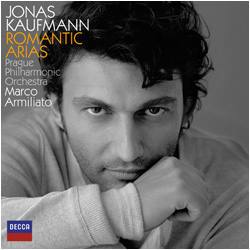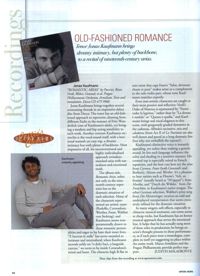|
|
|
|
|
|
|
|
| OPERA NEWS, April 2008 |
| JUDITH MALAFRONTE |
Critics Choice
|
OLD-FASHIONED ROMANCE
|
| Tenor Jonas Kaufmann brings
dreamy intimacy but plenty of backbone, to a recital of nineteenth-century
arias |
|
  “ROMANTIC ARIAS” by Puccini,
Bizet, Verdi, Weber, Gounod, et al. Prague Philharmonic Orchestra,
Armiliato. Texts and translations. Decca CD 4759966 “ROMANTIC ARIAS” by Puccini,
Bizet, Verdi, Weber, Gounod, et al. Prague Philharmonic Orchestra,
Armiliato. Texts and translations. Decca CD 4759966
Jonas Kaufmann brings together several contrasting threads in an impressive
debut disc from Decca. The tenor has an old-fashioned approach to
repertoire, drawing from different Fachs in the manner of Fritz Wunderlich
(one of Kaufmann’s idols), yet bringing a modern and hip acting sensibility
to each work. Another contrast Kaufmann reconciles is the vocal sound
itself, with a baritonal warmth yet easy top, a dreamy intimacy but with
plenty of backbone. Most impressive of all, his unconventional and highly
individualized approach revitalizes standard arias with naturalness and
emotional truth.
The album title, Romantic Arias, refers not only to the nineteenth-century
repertoire but to the dramatic situation of each selection. Many of the
characters represented are artistic types (Rodolfo, Cavaradossi, Werther,
Faust, Walther von Stolzing), and Kaufmann seems temperamentally drawn to
these romantic personalities and eager to lay bare their inner lives. “E
lucevan le stelle” has never sounded so intimate and internalized; when
Kaufmann ascends softly on “o dolci baci, o languide carezze,” we seem to be
inside Cavaradossi’s mind and heart. The climactic high B-flat in voix mixte
* that caps Faust’s “Salut, demeure chaste en pure” makes sense as a
complement to the solo violin part, whose tone Kaufmann matches expertly.
Even non-artistic characters are caught at their most pensive and
reflective: Verdi’s Duke of Mantua is represented by “Parmi veder le
lagrime,” rather than by “La donna è mobile” or “Questa o quella,” and
Kaufmann brings real vocal elegance to this scene, with gorgeously graded
dynamics in the cadenzas. Alfredo’s recitative, aria and cabaletta (from Act
II of La Traviata) are also well drawn and paced in a long dramatic line
(but why not embellish the repeats?).
Kaufmann’s distinctive voice is instantly appealing, yet rather than making
a generic sound, he lets each language influence the color and shading in a
sensitive manner. His covered top is especially suited to French repertoire,
and the best cuts here are the arias from Carmen, Faust (both Gounod’s and
Berlioz’s), Manon and Werther. It’s a pleasure to hear rarities such as
Flotow’s ‘Ach, so fromm” (usually heard as “M’appari”), from Martha, and
“Durch die Wälder,” from Der Freischütz, in Kaufmann’s native tongue. The
other German selection, Walther’s prize song from Die Meistersinger,
receives an odd and underplayed interpretation that seems excessively
refined for the dramatic situation.
In many singers, soft effects, especially at climactic musical moments, can
come across as cheap tricks, but Kaufmann has an honest musical approach
that serves the emotional line. It helps that he has actually sung most of
these roles in production; he brings an actor’s thought process to these
performances, as if each piece were a monologue, complete in itself yet
suggesting its place within the entire work. Marco Armiliato and the Prague
Philharmonic provide perfect support. |
| *der Fehler wurde in der Maiausgabe wie folgt korrigiert:
CORRECTION: The climactic note in voix mixte that caps Jonas
Kaufmann's performance of Faust's "Salut, demeure, chaste et pure" on his
Romantic Arias disc is a C, not a B-flat, as stated in Recordings
(April). |
|
|
|
|
|
|
|
|
|
|
|
|
|
|
|
|
|
| |
|
|
| |
|
|
|
|
|
|
|
|
|
|
|
|
|
|
|
|
|
|
| |
|
|
|
|
|
|
|
|
|
|
|